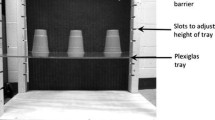Abstract
Over the last decade, the metacognitive abilities of nonhuman primates and the developmental emergence of metacognition in children have become topics of increasing research interest. In the current study, the performance of three adult chimpanzees (Pan troglodytes; Experiment 1) and forty-four 3.5- and 5.5-year-old human children (Experiment 2) was assessed on a behavioral search paradigm designed to assess metacognition. Subjects either directly observed the baiting of a large reward into one cup among an array of four, or had the baiting occluded from their view. In half of the trials, subjects were also presented with an additional distinctive cup that was always visibly baited with a small reward. This cup allowed subjects the opportunity to escape from making a guess about the location of the bigger reward. All three chimpanzees and both age groups of children selected the escape cup more often when the baiting of the large reward was concealed, compared to when it was visible. This demonstrates that both species can selectively choose a guaranteed smaller reward when they do not know the location of a larger reward and provides insight into the development of metacognition.





Similar content being viewed by others
Notes
Cassie received fewer warm-up trials because his experimental sessions ran over 2 days, rather than three, and each session commenced with such trials.
Holly only received one set of warm-up trials because her testing sessions continued on from each other without breaks within 1 day.
If the subject simply guessed the location of the large reward among the four red cups, ignoring the escape cup, in 16 trials, he/she would likely have received eight grapes at a .25 probability level of success by chance. If he/she guessed among all five cups indiscriminately, he would receive 10 grapes according to the .20 chance probability. However, if the subject chose the escape cup on every available trial, as Ockie did, he/she would receive 16 grapes.
References
Balcomb FK, Gerken L (2008) Three-year-old children can access their own memory to guide responses on a visual matching task. Dev Sci 11:750–760. doi:10.1111/j.1467-7687.2008.00725.x
Basile BM, Hampton RR, Suomi SJ, Murray EA (2009) An assessment of memory awareness in tufted capuchin monkey (Cebus apella). Anim Cogn 12:169–180. doi:10.1007/s10071-008-0180-1
Beran MJ, Smith JD (2011) Information seeking by rhesus monkeys (Macaca mulatta) and capuchin monkeys (Cebus apella). Cognition 120:90–105. doi:10.1016/j.cognition.2011.02.016
Beran MJ, Smith JD, Coutinho MVC, Couchman JJ, Boomer J (2009) The psychological organization of “uncertainty” responses and “middle” responses: a dissociation in capuchin monkeys (Cebus apella). J Exp Psychol Anim Behav Process 35:371–381. doi:10.1037/a0014626
Beran MJ, Decker S, Schwartz A, Smith JD (2012) Uncertainty monitoring by young children in a computerized task. Scientifica 2012:692890. doi:10.6064/2012/692890
Beran MJ, Smith JD, Perdue BM (2013) Language-trained chimpanzees (Pan troglodytes) name what they have seen but look first at what they have not seen. Psychol Sci 24:660–666. doi:10.1177/0956797612458936
Beran MJ, Perdue BM, Smith JD (2014) What are my chances? Closing the gap in uncertainty monitoring between rhesus monkeys (Macaca mulatta) and capuchin monkeys (Cebus apella). J Exp Psychol Animal Learn Cogn 40:303–316. doi:10.1037/xan0000020
Brauer J, Call J, Tomasello M (2004) Visual perspective taking in dogs (Canis familiaris) in the presence of barriers. Appl Anim Behav Sci 88:299–317. doi:10.1016/j.applanim.2004.03.004
Call J (2004) Inferences about the location of food in the great apes (Pan paniscus, Pan troglodytes, Gorilla gorilla, and Pongo pygmaeus). J Comp Psychol 118:232–241. doi:10.1037/0735-7036.118.2.232
Call J (2010) Do apes know that they could be wrong? Animal Cogn 13:689–700. doi:10.1007/s10071-010-0317-x
Call J, Carpenter M (2001) Do apes and children know what they have seen? Animal Cogn 3:207–220. doi:10.1007/s100710100078
Carruthers P (2008) Meta-cognition in animals: a skeptical look. Mind Lang 23:58–89. doi:10.1111/j.1468-0017.2007.00329.x
Collier-Baker E, Suddendorf T (2006) Do chimpanzees (Pan troglodytes) and 2-year-old children (Homo sapiens) understand double invisible displacement? J Comp Psychol 120:89–97. doi:10.1037/0735-7036.120.2.89
Collier-Baker E, Davis JM, Nielsen M, Suddendorf T (2006) Do chimpanzees (Pan troglodytes) understand single invisible displacement? Animal Cogn 9:55–61. doi:10.1007/s10071-005-0004-5
Couchman JJ, Coutinho MVC, Beran MJ, Smith JD (2010) Beyond stimulus cues and reinforcement signals: a new approach to animal metacognition. J Comp Psychol 124:356–368. doi:10.1037/a0020129
Cultice JC, Somerville SC, Wellman HM (1983) Preschoolers’ memory monitoring: feeling-of-knowing judgments. Child Dev 54:1480–1486. doi:10.2307/1129810
Estes D (1998) Young children’s awareness of their mental activity: the case of mental rotation. Child Dev 69:1345–1360. doi:10.2307/1132270
Flavell JH, Green FL, Flavell ER (2000) Development of children’s awareness of their own thoughts. J Cogn Dev 1:97–112. doi:10.1207/S15327647JCD0101N_10
Foote AL, Crystal JD (2007) Metacognition in the rat. Curr Biol 17:551–555. doi:10.1016/j.cub.2007.01.061
Fujita K (2009) Metamemory in tufted capuchin monkeys (Cebus apella). Animal Cogn 12:575–585. doi:10.1007/s10071-009-0217-0
Gopnik A, Graf P (1988) Knowing how you know: young children’s ability to identify and remember the sources of their beliefs. Child Dev 59:1366–1371. doi:10.2307/1130499
Hampton RR (2001) Rhesus monkeys know when they remember. Proc Natl Acad Sci USA 98:5359–5362. doi:10.1073/pnas.071600998
Hampton RR (2009) Multiple demonstrations of metacognition in nonhumans: converging evidence or multiple mechanisms? Comp Cogn Behav Rev 4:17–28. doi:10.3819/ccbr.2009.40002
Haun DBM, Nawroth C, Call J (2011) Great apes’ risk-taking strategies in a decision making task. PLos ONe 6(12):1–6. doi:10.1371/journal.pone.0028801
Hawkins J, Pea RD, Glick J, Scribner S (1984) “Merds that laugh don’t like mushrooms”: evidence for deductive reasoning by preschoolers. Dev Psychol 20:584–594. doi:10.1037/0012-1649.20.4.584
Hicks RD (1907) De Anima: with translation, introduction and notes. University Press, Cambridge
Hill A, Collier-Baker E, Suddendorf T (2011) Inferential reasoning by exclusion in great apes, lesser apes, and spider monkeys. J Comp Psychol 125:91–103. doi:10.1037/a0020867
Inman A, Shettleworth SJ (1999) Detecting metamemory in nonverbal subjects: a test with pigeons. J Exp Psychol Anim Behav Process 25:389–395. doi:10.1037/0097-7403.25.3.389
Johnson CN, Wellman HM (1980) Children’s developing understanding of mental verbs—remember, know, and guess. Child Dev 51:1095–1102. doi:10.1111/j.1467-8624.1980.tb02658.x
Jozefowiez J, Staddon JER, Cerutti DT (2009) Reinforcement and metacognition. Comp Cogn Behav Rev 4:58–60. doi:10.3819/ccbr.2009.40007
Kepecs A, Uchida N, Zariwala HA, Mainen ZF (2008) Neural correlates, computation and behavioural impact of decision confidence. Nature 455:227–231. doi:10.1038/nature07200
Kornell N, Son LK, Terrace HS (2007) Transfer of metacognitive skills and hint seeking in monkeys. Psychol Sci 18:64–71. doi:10.1111/j.1467-9280.2007.01850.x
Kreutzer MA, Leonard C, Flavell JH (1975) An interview study of children’s knowledge about memory monographs of the society for research in child development 40:1–60. doi:10.2307/1165955
Lockl K, Schneider W (2002) Developmental trends in children’s feeling-of-knowing judgements. Int J Behav Dev 26:327–333. doi:10.1080/01650250143000210
Marsh HL, MacDonald SE (2012a) Information seeking by orangutans: a generalized search strategy? Animal Cogn 15:293–304. doi:10.1007/s10071-011-0453-y
Marsh HL, MacDonald SE (2012b) Orangutans (Pongo abelii) “play the odds”: information-seeking strategies in relation to cost, risk, and benefit. J Comp Psychol 126:263–278. doi:10.1037/a0025906
McMahon S, Macpherson K, Roberts RA (2010) Dogs choose a human informant: metacognition in canines. Behav Processes 85:293–298. doi:10.1016/j.beproc.2010.07.014
Morrongiello BA, Lasenby J (2006) Finding the daredevils: development of a Sensation Seeking Scale for children that is relevant to physical risk taking. Accid Anal Prev 38:1101–1106. doi:10.1016/j.aap.2006.04.018
Morrongiello BA, Rennie H (1998) Why do boys engage in more risk taking than girls? The role of attributions, beliefs, and risk appraisals. J Pediatr Psychol 23:33–43. doi:10.1093/jpepsy/23.1.33
Nelson T, Narens L, Bower G (1990) The psychology of learning and motivation New York
Nielsen M, Collier-Baker E, Davis JM, Suddendorf T (2005) Imitation recognition in a captive chimpanzee (Pan troglodytes). Animal Cogn 8:31–36. doi:10.1007/s10071-004-0232-0
Paukner A, Anderson JR, Fujita K (2006) Redundant food searches by capuchin monkeys (Cebus apella): a failure of metacognition? Animal Cogn 9:110–117. doi:10.1007/s10071-005-0007-2
Perdue BM, Evans TA, Williamson RA, Gonsiorowski A, Beran MJ (2014) Prospective memory in children and chimpanzees. Animal Cogn 17:287–295. doi:10.1007/s10071-013-0661-8
Pillow BH (2002) Children’s and adults’ evaluation of the certainty of deductive inferences, inductive inferences, and guesses. Child Dev 73:779–792. doi:10.1111/1467-8624.00438
Povinelli DJ, DeBlois S (1992) Young children’s (Homo sapiens) understanding of knowledge formation in themselves and others. J Comp Psychol 106:228–238. doi:10.1037/0735-7036.106.3.228
Roberts WA, Feeney MC, McMillan N, MacPherson K, Musolino E, Petter M (2009) Do pigeons (Columbia livia) study for a test? J Exp Psychol Anim behav process 35:129–142. doi:10.1037/a0013722
Rohwer M, Kloo D, Perner J (2012) Escape from metaignorance: how children develop an understanding of their own lack of knowledge. Child Dev 83:1869–1883. doi:10.1111/j.1467-8624.2012.01830.x
Schneider W (1999) The development of metamemory in children. In: Koriat DGA (ed) Attention and performance XVII: Cognitive regulation of performance: Interaction of theory and application. Attention and performance. The MIT Press, Cambridge, MA, pp 487–514
Schneider W (2008) The development of metacognitive knowledge in children and adolescents: Major trends and implications for education mind brain and education 2:114–121. doi:10.1111/j.1751-228X.2008.00041.x
Scholnick EK, Wing CS (1995) Logic in conversation: comparative studies of deduction in children and adults. Cogn Dev 10:319–345. doi:10.1016/0885-2014(95)90001-2
Smith JD, Schull J, Strote J, McGee K, Egnor R, Erb L (1995) The uncertain response in the bottle-nosed dolphin (Tursiops truncatus). J Exp Psychol General 124:391–408. doi:10.1037/0096-3445.124.4.391
Smith JD, Shields WE, Schull J, Washburn DA (1997) The uncertain response in humans and animals. Cognition 62:75–97. doi:10.1016/s0010-0277(96)00726-3
Smith JD, Shields WE, Washburn DA (2003) The comparative psychology of uncertainty monitoring and metacognition. Behav Brain Sci 26:317+
Smith JD, Beran MJ, Redford JS, Washburn DA (2006) Dissociating uncertainty responses and reinforcement signals in the comparative study of uncertainty monitoring. J Exp Psychol Gen 135:282–297. doi:10.1037/0096-3445.135.2.282
Smith JD, Beran MJ, Couchman JJ, Coutinho MVC (2008) The comparative study of metacognition: sharper paradigms, safer inferences. Psychon Bull Rev 15:679–691. doi:10.3758/PBR.15.4.679
Suda-King C (2008) Do orangutans (Pongo pygmaeus) know when they do not remember? Animal Cogn 11:21–42. doi:10.1007/s10071-007-0082-7
Suda-King C, Bania AE, Stromberg EE, Subiaul F (2013) Gorillas’ use of the escape response in object choice memory tests. Animal Cogn 16:65–84. doi:10.1007/s10071-012-0551-5
Terrace HS (2005) Metacognition and the Evolution of Language. In: Metcalfe HSTJ (ed) The missing link in cognition: origins of self-reflective consciousness. Oxford University Press, New York, NY, pp 84–115
Terrace HS, Son LK (2009) Comparative metacognition. Curr Opin Neurobiol 19:67–74. doi:10.1016/j.conb.2009.06.004
Washburn DA, Smith JD, Taglialatela LA (2005) Individual differences in metacognitive responsiveness: cognitive and personality correlates. J Gen Psychol 132:446–461. doi:10.3200/GENP.132.4.446-461
Wellman HM (1977) Tip of the tongue and feeling of knowing experiences: a developmental study of memory monitoring. Child Dev 48:13–21. doi:10.2307/1128875
Wellman HM, Cross D, Watson J (2001) Meta-analysis of theory-of-mind development: the truth about false belief. Child Dev 72:655–684. doi:10.1111/1467-8624.00304
Acknowledgments
We gratefully acknowledge the kind and generous help offered us by the staff of the Rockhampton Botanical and Zoological Gardens, and its coordinator Graeme Strachan. Subsequent to our data collection, one of our participants, Ockie, passed away from natural causes. As a willing and interested participant across multiple studies, we take this opportunity to acknowledge his contribution to our discipline and for broadening our understanding of primate cognition. He will be missed. We also thank David Butler and Cameron Turner for their assistance in data collection, Jeremy Nash for his role in reliability coding, and Andrew Hill for construction of the apparatus. This study was supported by an Australian Research Council Discovery Project Grant (DP140101410).
Conflict of interest
The authors declare that they have no conflict of interest.
Ethical approval for human participants
All procedures performed in studies involving human participants were in accordance with the ethical standards of the institutional and/or national research committee and with the Declaration of Helsinki 1964 and its later amendments or comparable ethical standards.
Ethical approval for animal subjects
All applicable international, national, and/or institutional guidelines for the care and use of animals were followed. All procedures performed in studies involving animals were in accordance with the ethical standards of the institution or practice at which the studies were conducted.
Informed consent
Informed consent was obtained from all individual participants and their guardians included in the study.
Author information
Authors and Affiliations
Corresponding author
Electronic supplementary material
Below is the link to the electronic supplementary material.
Rights and permissions
About this article
Cite this article
Neldner, K., Collier-Baker, E. & Nielsen, M. Chimpanzees (Pan troglodytes) and human children (Homo sapiens) know when they are ignorant about the location of food. Anim Cogn 18, 683–699 (2015). https://doi.org/10.1007/s10071-015-0836-6
Received:
Revised:
Accepted:
Published:
Issue Date:
DOI: https://doi.org/10.1007/s10071-015-0836-6




